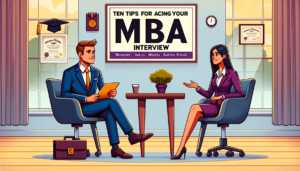
The structure of Booth’s two main personal statement essays is unusual and difficult. The essay below is a clear enough guideline for building your own essays, especially if you’re already a strong writer. But if you need additional help, Gurufi.com has 17 years of helping MBA applicants get into their dream schools, including five of our seven clients who applied to Booth in the last full cycle. All we do is admissions writing, and we’re expert at it!
Chicago Booth’s personal statement prompts are a bit different. Rather than having a single longer essay, you’re required to break the essay in two, with one focusing on your career goals and the other asking you to be a bit more personal. For people who are quite adept at weaving together multiple narratives and ideas into a single coherent essay, this can feel like a frustrating lost opportunity… but for the other 99% of people, it seems much simpler and more straightforward. That said, this format requires you to place great emphasis on clarity, precision, and efficiency, and to plan out beforehand what you want each essay to say and how they complement each other. Thus, much like Stanford’s two essays, there is a sense in which you should view these two mini-essays as a single interconnected idea divided over two essays.
What does that mean? It means that you should begin this exercise by identifying three things: who you were (and stories / examples that demonstrate that), who you are (what are you doing now?), and what you aspire to become. All three should align and make sense as a coherent trajectory. I talked more about this here, but if you don’t want to watch the video, here’s the short version: when you talk about your past, your present, and your future, it needs to feel like they’re all the same person. So, Essay 1 asks you to focus on the future. But, as you plan and write Essay 2, which is asking you to talk about your background and values, think about how your life, background, and values inform, guide, and inspire the person you seek to become. This needs to feel connected, and it’s important that these two essays have that point of tangency.
A few other big-picture things before we dive into the specifics. As the world’s most flexible full-time MBA program, Chicago Booth emphasizes academic preparedness, intellectual curiosity, and communication skills. The program seeks ambitious, intellectually curious professionals—bold leaders eager to advance their careers at a leading academic business school. Try to embody that in your essay.
Essay #1: Career Goals and the Booth MBA
Essay One: How will the Booth MBA help you achieve your immediate and long-term post-MBA career goals? (250-word minimum)
Understanding the Prompt:
The prompt for Essay #1 focuses on your career goals and how an MBA from Booth will help you achieve them. It requires a blend of professional insight and academic aspiration.
Structure and Content:
- Career Background: Start with a brief account of your career history. Highlight key skills, knowledge, and achievements, setting the stage for your future ambitions. Remember, you can’t credibly talk about what you hope to do unless you can tie that aspiration to what you’ve already done. (again, think in terms of past, present, and future needing to make a straight coherent line)
- Short-Term Goals: Clearly define your immediate post-MBA goals. Include desired roles, industries, and potential organizations. Ensure these goals align logically with your current skill set, indicating a realistic yet ambitious trajectory. The point here is that these should be designed to procure you the final bits of knowledge, skill, experiences, and / or connections you need to attain your long-term goal.
- Long-Term Vision: Articulate your broader career vision. Show how your short-term goals are stepping stones towards these long-term aspirations.
- Identifying Skill Gaps: Reflect on the skills and knowledge you need to acquire to achieve your goals. This introspection is crucial for the next part.
- Booth’s Role: Connect your goals and identified gaps with what Booth offers. Dive deep into Booth’s curriculum, culture, and resources. Be specific about how these will bridge your gaps and propel you towards your career objectives. DON’T turn it into a brochure for Booth where you simply list off stuff you found on their website; instead, thoughtfully curate one or two key advantages or resources that are unique to Booth and mention those.
- Demonstrating Fit: Convey your understanding of and alignment with Booth’s ethos. Show self-awareness and a clear vision of how you’ll contribute to and benefit from the Booth community.
e
Essay #2: Personal Growth and Development
Essay Two: An MBA is as much about personal growth as it is about professional development. In addition to sharing your experience and goals in terms of career, we’d like to learn more about you outside of the office. Use this opportunity to tell us something about who you are. (250-word minimum)
Understanding the Prompt:
This essay seeks to uncover who you are beyond your professional life. It’s about your personal journey, values, and motivations. As noted above, you should still try to build points of tangency between these essays, though the tone might be a bit different.
Structure and Content:
- Personal Stories: Share meaningful anecdotes from your life outside work. Focus on experiences that shaped your values, priorities, and character. These aren’t random stories, though. They should explain your journey to the role / goal you aspire to achieve.
- Leadership and Passions: Highlight any leadership roles or significant passions. Discuss hobbies, volunteer work, or personal projects that are integral to who you are.
- Challenges and Growth: Don’t shy away from discussing difficulties. Show how overcoming challenges has contributed to your personal development.
- Aligning with Booth: Explain how your personal attributes and experiences resonate with Booth’s values and offerings. Illustrate how you’ll engage with the community and contribute uniquely.
General Tips for Both Essays:
- Self-Awareness: Exhibit a deep understanding of yourself, your motivations, and how your experiences have shaped you. Self-awareness is key to both essays.
- Research and Specificity: Your knowledge of Booth’s program should shine through. Avoid generic statements; instead, provide details that show you’ve done your homework.
- Storytelling: Use stories to bring your essays to life. Whether discussing professional achievements or personal experiences, narratives make your application memorable.
- Alignment with Booth: Demonstrate how your goals and values align with Booth’s culture and offerings. Show that you are not just seeking any MBA, but specifically Booth’s MBA.
- Reflection and Insight: Go beyond narrating experiences. Reflect on their significance and how they’ve prepared you for the challenges and opportunities at Booth.
- Balance and Cohesion: Ensure that your essays complement each other, presenting a well-rounded picture of your professional and personal sides.
Crafting your Chicago Booth personal statement is an opportunity to introspect and articulate your career aspirations and personal journey. By thoughtfully responding to the prompts, showcasing your alignment with Booth’s ethos, and demonstrating your unique value proposition, you can make a compelling case for your admission. Remember, Booth values intellectually curious and ambitious individuals who are ready to make a significant impact in the business world. Your essays should reflect these qualities, along with a clear understanding of how Booth’s MBA will facilitate your goals.
For more help with your personal statement, check us out at Gurufi.com. Our personal statement editors and consultants have decades of experience helping clients get into top Masters and Ph.D. programs in STEM, humanities, fine arts, and social sciences. Our specialty is helping you craft compelling personal statements that move the needle in your admissions process! For questions, shoot us an email at service@gurufi.com. Check us out on Facebook, Twitter, and LinkedIn.









